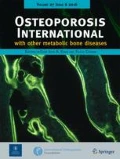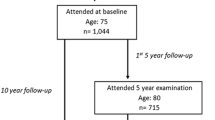Abstract
Summary
A longitudinal study of women aged 40–80 predicted single falls from a previous fall history and deficient vestibular integration. Multiple falls were predicted by a fall history, low activity levels, more medical conditions and deficient vestibular integration. Low bone mineral density, more medical conditions and fall history predicted fractures.
Introduction
The purpose of this study was to identify potentially modifiable health-related factors predicting falls and fractures, focussing on women over 40.
Methods
Four hundred and forty-nine women aged 40–80 years from the Longitudinal Assessment of Women study participated. Demographic information (age, BMI, medications, medical conditions and activity level), balance assessments (including timed up & go and modified clinical test for sensory interaction of balance) and measurements of bone mineral density and body composition were collected in 2001; fall and fracture data were gathered in 2003, 2005, 2007, 2008 and 2010 to determine incidence.
Results
Multinomial logistic regression revealed that single falls could be predicted by a history of previous falls (OR 3.08) and being unsteady in bipedal stance on foam with eyes closed (OR 1.99). Multiple falls were predicted by a history of falls at baseline (OR 4.69), low levels of activity (OR 2.17), greater number of medical conditions (OR 1.12) and being unsteady in bipedal stance on foam with eyes closed (OR 4.21). Low bone mineral density (OR 3.13), greater number of medical conditions (OR 1.32) and a history of falls (OR 3.04) were predictive of fractures.
Conclusions
Poor health, decreased balance, and inactivity are predictive of falls and low bone mineral density, low activity level and poor health predictive fractures. Results suggest failing the balance test bipedal stance on foam with eyes closed in the presence of low activity and poor health is a valid quick screening tool for detecting potential fallers for referral for in-depth balance assessment and intervention.
Similar content being viewed by others
References
Moller J (2003) Projected costs of fall related injury to older persons due to demographic change in Australia. Commonwealth Department of Health and Ageing, Canberra
Burge R, Dawson-Hughes B, Solomon DH, Wong JB, King A, Tosteson A (2007) Incidence and economic burden of osteoporosis fractures in the United States, 2005-2025. J Bone Miner Res 22(3):465–475
Compston JE, Watts NB, Chapurlat R, Cooper C, Boonen S, Greenspan S et al (2011) Obesity is not protective against fracture in postmenopausal women: GLOW. JAMA 124(11):1043–1050
Mertz KJ, Lee D, Sui X, Powell KE, Blair SN (2010) Falls among adults: the association of cardiorespiratory fitness and physical activity with walking-related falls. Am J Prev Med 39(1):15–24
Rubenstein LZ, Josephson KR (2006) Falls and their prevention in elderly people: what does the evidence show? Med Clin N Am 90:807–824
Masud T, Morris R (2001) Epidemiology of falls. Age Ageing 30:3–7
Gregg EW, Pereira MA, Caspersen CJ (2000) Physical activity, falls and fractures among older adults. JAGS 48(8):883–893
Taylor BC, Schreiner PJ, Stone KL, Fink HA, Cummings SR, Nevitt MC, Bowman PJ, Ensrud KE (2004) Long-term prediction of incident hip fracture risk in elderly white women: study of osteoporotic fractures. JAGS 52:1479–1486
King MB, Tinetti ME (1995) Falls in community-dwelling older persons. JAGS 43(10):1146–1154
Tromp AM, Pluijm SM, Smit JH, Deeg DJ, Bouter LM, Lips P (2001) Fall-risk screening test: a prospective study on predictors for falls in community-dwelling elderly. J Clin Epidemiol 54:837–844
Graafmans WC, Ooms ME, Hofstee HMA, Bezemer PD, Bouter LM, Lips P (1996) Falls in the elderly: a prospective study of risk factors and risk profiles. Am J Epidemiol 143:1129–1136
Nevitt MC, Cummings SR, Kidd S, Black D (1989) Risk factors for recurrent nonsyncopal falls. JAMA 261:2663–2668
Talbot LA, Musiol RJ, Witham EK, Metter EJ (2005) Falls in young, middle-aged and older community dwelling adults: perceived cause, environmental factors and injury. BMC Pub Health 86(5):1–9
Khoo SK, O'Neill S, Travers C, Oldenburg B (2008) Age-related changes relevant to health in women: design, recruitment, and retention strategies for the Longitudinal Assessment of Women (LAW) study. J Women's Health 17(1):135–146
Webster S, Khan A, Nitz JC (2011) Validation of a brief questionnaire to measure population activity levels. J Clin Gerontol Geriatr 2:83–87
Shumway-Cook A, Horak F (1986) Assessing the influence of sensory interaction on balance. Phys Ther 66:1548–1550
Cohen H, Blatchly CA, Gombash LL (1993) A study of the clinical test of the sensory interaction and balance. Phys Ther 73:346–354
Podsiadlo D, Richardson S (1991) The timed “up & go”: a test of basic functional mobility for frail elderly persons. JAGS 39(2):142–148
Shumway-Cook A, Brauer S, Woollacott M (2000) Predicting the probability for falls in community-dwelling older adults using the timed up & go test. Phys Ther 80(9):896–903
Low Choy N, Brauer S, Nitz J (2008) Linking stability to demographics, strength and sensory system function in women over 40 to support pre-emptive prevention intervention. Climacteric 11:144–154
Langley J, Samaranayaka A, Davie G, Campbell AJ (2011) Age, cohort and period effects on hip fracture incidence: analysis and predictions from New Zealand data 1974-2007. Osteoporosis Int 22:105–111
Dargent-Molina P, Favier F, Grandjean H, Baudoin C, Schott AM, Meunier PJ et al (1996) Fall-related factors and risk of hip fracture: the EPIDOS prospective study. Lancet 348:145–149
Sambrook PN, Flahive J, Hooven FH, Boonen S, Chapurlat R, Lindsay R et al (2011) Predicting fractures in an international cohort using risk factor algorithms without BMD. Osteoporosis Int 26:2770–2777
Barrett-Connor E, Weiss TW, McHorney CA, Miller PD, Siris ES (2009) Predictors of falls among postmenopausal women: results from the National Osteoporosis Risk Assessment (NORA). Osteoporosis Int 20:715–722
Bradley C, Pointer S (2008) Hospitalisations due to falls by older people, Australia, 2005-06. Injury research and statistics series, number 50. Adelaide (Australia): Australian Institute of Health and Welfare
Hill K, Kerse N, Lentini F, Gilsenan B, Osbourne D, Browning C (2002) Falls: a comparison of trends in community, hospital and mortality data in older Australians. Aging 14:18–27
Low Choy NL, Brauer SG, Nitz JC (2007) Timed stance performance reflects differences in age, prevalence of comorbidities, medication use, fall history and activity level: early screening for balance loss is indicated. Australas J Ageing 26(1):29–34
Gillespie LD, Gillespie WJ, Robertson MC, Lamb SE, Cumming RG, Rowe BH (2003) Interventions for preventing falls in elderly people. Cochrane Database of Systematic Reviews Issue 4
Penedo FJ, Dahn JR (2005) Exercise and well-being: a review of mental and physical health benefits associated with physical activity. Curr Opin Psychiatry 18:189–193
Yaffe K, Barnes D, Nevitt M, Lui L, Covinsky K (2001) A prospective study of physical activity and cognitive decline in elderly women. Arch Intern Med 161:1703–1708
Coupland C, Wood D, Cooper C (1993) Physical inactivity is an independent risk factor for hip fracture in the elderly. J Epidemiol Community Health 47:441–443
Moayyeri A (2008) The association between physical activity and osteoporotic fractures: a review of the evidence and implications for future research. Ann Epidemiol 18(11):827–835
Iwamoto J, Sato Y, Takeda T, Matsumoto H (2009) Role of sport and exercise in the maintenance of female bone health. J Bone Miner Metab 27:530–537
Macdonald HM, Ashe MC, McKay HA (2009) The link between physical activity and bone strength across the lifespan. Int J Clin Rheumatol 4(4):437–463
Rubenstein LZ (2006)) Falls in older people: epidemiology, risk factors and strategies for prevention. Age Ageing 35(S2):ii37–ii41
Chang JT, Morton SC, Rubenstein LZ, Mojica WA, Maglione M, Suttorp MJ, Roth EA, Shekelle PG (2004) Interventions for the prevention of falls in older adults: systematic review and meta-analysis of randomised clinical trials. BMJ 328:680
Albrand G, Munoz F, Sornay-Rendu E, DuBoeul F, Delmas PD (2003) Independent predictors of all osteoporosis-related fractures in health postmenopausal women: the OFELY study. Bone 32(1):78–85
Finlayson ML, Peterson EW (2010) Falls, aging, and disability. Phys Med Rehabil Clin N Am 21:357–373
Pirro M, Fabbriciani G, Leli C, Callarelli L, Manfredelli MR, Fioroni C, Mannarino MR, Scarponi AM, Mannarino E (2010) High weight or body mass index increase the risk of vertebral fractures in postmenopausal osteoporotic women. J Bone Miner Metab 28:88–93
Conflicts of interest
None.
Author information
Authors and Affiliations
Corresponding author
Rights and permissions
About this article
Cite this article
Nitz, J., Stock, L. & Khan, A. Health-related predictors of falls and fractures in women over 40. Osteoporos Int 24, 613–621 (2013). https://doi.org/10.1007/s00198-012-2004-z
Received:
Accepted:
Published:
Issue Date:
DOI: https://doi.org/10.1007/s00198-012-2004-z




